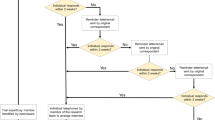Abstract
There has been considerable debate about the ethical acceptability of using placebo-controls in clinical research. Although this debate has been rich in rhetoric, considering that much of this research is predicated upon the assumption that data from this research is vital to clinical decision-making, it is ironic that researchers have introduced little data into these discussions. Using some published research concerning the use of placebo-controls in clinical research in hypertension and psychiatric drug trials, I suggest some ways that such data might be incorporated into the ethical analysis concerning placebo use in clinical trials. This approach promises to be important for enhancing conceptual and scientific understanding as well as public policy decision-making.
Similar content being viewed by others
References
Temple, R., Ellenberg, S.S. (2000) Placebo-controlled trials and active-control trials in the evaluation of new treatments. Part 1: ethical and scientific issues, Annals of Internal Medicine 133: 455–63.
Temple, R., Ellenberg, S.S. (2000) Placebo-controlled trials and active-control trials in the evaluation of new treatments. Part 2: practical issues and specific cases, Annals of Internal Medicine 133: 464–470.
Sugarman, J. (2002) Ethics in the design and conduct of clinical research, Epidemiologic Reviews 24: 54–58.
Lavori, P.W., Sugarman, J., Hays, M.T., Feussner, J.R. (1999) Improving informed consent in clinical trials: a duty to experiment, Controlled Clinical Trials 20: 187–193.
Rothman, K.J., Michels, K.B. (1994) The continuing unethical use of placebo controls, New England Journal of Medicine 331: 394–398.
Greene, B.M., Taylor, H.R., Cupp, E.W., et al. (1985) Comparison of ivermectin and diethylcarbamazine in the treatment of onchocerciasis, New England Journal of Medicine 313: 133–138.
Taylor, H.R. (1995) The use of placebo controls, New England Journal of Medicine 33: 60–61.
Angell, M. (1997) The ethics of clinical research in the third world, New England Journal of Medicine 337: 847–849.
Macklin, R. (1998). Justice in international research, in: Kahn, J.P., Mastroianni A.M., & Sugarman, J., eds. Beyond consent: seeking justice in research, Oxford University Press, pp. 131–146.
World Medical Association, (2000), Declaration of Helsinki, http://www.wma.net/e/policy/17-c_e.html.
Freedman, B., Weijer, C., Glass, K.C. (1996) Placebo orthodoxy in clinical research I: empirical and methodological myths, Journal of Law, Medicine and Ethics 24: 243–251.
Freedman, B., Glass, K.C., Weijer, C. (1996) Placebo orthodoxy in clinical research II: ethical, legal, and regulatory myths, Journal of Law, Medicine and Ethics 24: 252–9.
Emanuel, E.J., Miller, F.G. (2001) The ethics of placebo-controlled trials — a middle ground, New England Journal of Medicine 345: 915–919.
International Conference for Harmonization of Technical Requirements for the Registration of Pharmaceuticals for Human Use (ICH), “Topic E10: Choice of control group in clinical trials,” The European Agency for the Evaluation of Medicinal Products, London, July 2000. See www.ifpma.org/ich7.html.
Al-Khatib, S.M., Califf, R.M., Hasselblad, V., Alexander, J.H., McCrory, D.C., Sugarman, J. (2001) Placebo-controls in short-term clinical trials of hypertension, Science 292: 2013–2015.
Halperin S.D., Ubel, P.A., Berlin, J.A., Townsend, R.R., Asch, D.A. (2002) Physicians’ preferences for active-controlled versus placebo-controlled trials of new antihypertensive drugs, Journal of General Internal Medicine 17: 689–695.
Boisaubin, E.V. (2002) Practitioners and clinical trials: true to your patients — or science? Journal of General Internal Medicine 17: 738–739.
Charney, D.S., Nemeoff, C.B., Lewis, L., et al. (2002) National Depressive and Manic-Depressive Association consensus statement on the use of placebo in clinical trials of mood disorders, Archives of General Psychiatry 59: 262–270.
Khan, A., Warner, H.A., Brown, W.A. (2000) Symptom reduction and suicide risk in patients treated with placebo in antidepressant clinical trials, Archives of General Psychiatry 57: 311–317.
Storosum J.G., van Zwieten, B.J., Wohlfarth T., de Haan, L., Khan, A., van den Brink, W. (2003) Suicide risk in placebo-controlled trials for schizophrenia, Archives of General Psychiatry 60: 365–368.
Lavori, P. W., Sugarman, J. (2000) Placebo revisited, Acta Psychiatrica Scandinavica 101: 173–175.
Author information
Authors and Affiliations
Corresponding author
Rights and permissions
About this article
Cite this article
Sugarman, J. Using empirical data to inform the ethical evaluation of placebo controlled trials. SCI ENG ETHICS 10, 29–35 (2004). https://doi.org/10.1007/s11948-004-0059-8
Received:
Accepted:
Issue Date:
DOI: https://doi.org/10.1007/s11948-004-0059-8



